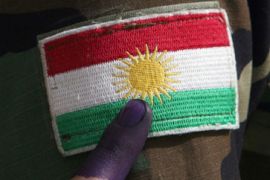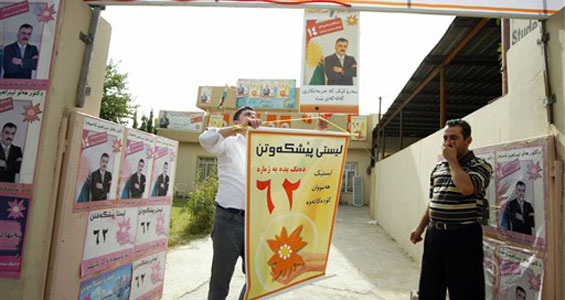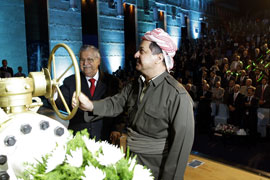Kurds hope for multi-party system
Elections in Iraq’s Kurdish regions give rise to vocal opposition groups.

 |
| Opposition parties have galvanised the electorate ahead of the elections [AFP] |
On July 25, nearly 2.5 million registered voters in Iraq’s semi-autonomous Kurdish region will be heading to the polls to cast their ballots in the presidential and parliamentary elections.
For Dashne Ibrahim, a 28-year-old media professional, it will be the third time she has participated in the Kurdish democratic experiment.
It will also be the first time she believes her vote might make any difference to the political set-up that has been in place since 1991, when ethnic Kurds were granted semi-autonomy over three provinces in northern Iraq.
“Back in 2005, nobody was enthusiastic about voting, nobody felt as though their opinion mattered,” she says.
“It was always ‘[the] government knows best’. But it’s a different picture now,” she adds.
“The people believe their confidence must be earned and they are asking the establishment, ‘what have you done for us lately?'”
Mounting frustrations
Seventeen years after the first elections were held in the Kurdish region, the populace, now ‘liberated’, has become frustrated.
Saddam Hussein, who suppressed the Kurds for decades, may be gone and the Kurdish region may, arguably, be the most peaceful part of strife-ridden Iraq, but ordinary people are struggling with inadequate basic services and seething over allegations of corruption and nepotism.
“Yes, we are grateful to the leadership for waging the struggle against the regime of Saddam Hussein and for liberating ‘Kurdistan’.”
“This is why we voted them into power in 1992, and even in 2005,” says Ibrahim, who has written several articles in local papers over the years calling on the regional authorities to pay closer attention to the demands of the people.
“But most people today are tired of hearing about what was done in the past … they want to know what the government will do for them now,” she says.
On the eve of the elections, there is a palpable sense that positive change is in the offing, and that nascent institutions will be strengthened.
These include Kurdistan’s parliament, the emerging independent media and an increasingly mobilised civil society.
These developments could address any lingering concerns held by prospective foreign investors, notably in the oil sector and construction, about the potential for sustained peace and stability in the region.
Mobilised opposition groups
 |
| There has been mounting opposition to Barzani’s rule in Iraq’s Kurdish regions [AFP] |
The emergence of a bona fide opposition movement called ‘Gorran’ (Change) three years ago has also changed the rules of the game.
Until now, the political landscape had largely been dominated solely between the two ruling parties – the Kurdistan Democratic Party (KDP) and the Patriotic Union of Kurdistan (PUK) – since the end of the 1991 Gulf War.
The participation of more than 20 political groupings in this election race will mark the beginning of a potential multi-party system and power-sharing mechanism in government.
This bodes well for a more inclusive decision-making process, giving a voice to minority ethnic and religious groups who have seldom been heard in the past.
This has coincided with the coming of age of a new generation of Kurds who are too young to remember the struggle against Saddam’s regime, and who have pushed the establishment to re-evaluate their approach to governance.
This, Ibrahim says, is the key difference between the Kurdistani List (a coalition of the PUK and the KDP) and the Gorran List, a self-proclaimed harbinger of reform comprised in the main of former PUK party members.
‘Change’ has been the campaign mantra for all candidates running for election.
Cautious scepticism
However, expectations remain tempered by experience. Even the most idealistic voters realise that the process is not likely to result in dramatic change.
According to polls conducted by the Kurdistan Regional Government (KRG), Massoud Barzani, Iraqi Kurdistan’s incumbent president, is likely to win another term, and the two ruling parties will garner majority seats in parliament yet again.
Qubad Talabani, the KRG’s representative in Washington, DC, stresses that these elections will give the ruling parties a chance to reaffirm their legitimacy.
“Citizens are far more sceptical these days, which, in a way, is good as the added scrutiny of the government, the parties and other governing institutions means greater accountability, which we all hope translates into better transparency and governance,” he says.
Talabani, son of Jalal Talabani, the Iraqi president and founding head of the PUK, maintains the Kurdish leadership is well aware that popular expectations have grown over the past few years, and insists steps are being taken to address this.
He cites the free press law passed last year that decriminalised libel and the KRG’s latest good governance and transparency initiative, being designed with the assistance of internationally renowned consulting firm Price Waterhouse Coopers.
Talabani commends the “healthy opposition” to the traditionally stronger parties, but points out: “It is relatively easy to be in the opposition, we know, we were in the Iraqi opposition for decades, but when it comes to governance, and having to deliver on your campaign promises, it’s a different world, and a far more challenging one.”
Referendum delayed
 |
| Kurdish aspirations to control the oil reserves in the north upset ties with Baghdad [GETTY] |
Despite the widespread popularity of the Gorran List, there is still an element of the unknown and the untested.
The movement may have tapped into the people’s deeply-rooted frustrations with poverty and lack of opportunities, but to what extent would their slogans be translated into solutions?
The dream of an independent Kurdish state, once a key reference in campaigns to garner popular support, is now overshadowed by the more pressing daily requirements of potable water and constant, uninterrupted electricity.
The average Iraqi Kurd appreciates the geopolitical and economic challenges involved in declaring independence at this point in time, and is no longer keen on sacrificing their life or even the standard of living for this lofty ambition.
In fact, the KRG has delayed plans to hold a referendum on implementing a new constitution – which has been perceived as a step toward full independence – after the independent electoral commission denied them permission to do so.
The new constitution has been in the pipeline for some time, but it has stirred controversy in Baghdad because it lays claim to oil-rich Kirkuk (and other disputed cities) as part of the Kurdistan Region.
Critics have also alleged that it violates the federal constitution and gives the KRG more power than Baghdad.
Additionally, the timing of the planned referendum was contentious not only in Baghdad but also within the region.
One high-ranking PUK official stated that the new constitution would have disqualified political parties with ‘foreign backing’ from standing for election – albeit, other officials promptly denied that this was the primary motive for expediting the new constitution.
Such allegations are part of a larger set of claims made by reformists, who hold that the Kurdistan List is using the government’s resources to fund and strengthen its own campaign.
Strengthening opposition voices
| In depth | ||
|
Nevertheless, Denise Natali, an academic specialising in Kurdish affairs, maintains the elections are a wake-up call to the ruling parties.
“Even if the opposition lists such as Gorran and Khizmet u Chaksazi (Services and Reform) do not win a majority vote, which they are unlikely to do, they can gain up to 25 per cent of the seats in Kurdistan’s parliament and create an opposition voice within,” she points out.
“The elections will challenge the monopolisation of power by the KDP and PUK, and [increase] pressure for greater representation by alternative voices.”
The use of ‘closed lists’ in this election has also been condemned by observers and voters alike.
In ‘closed lists’, voters can only vote for political parties as a whole and have no say on which party candidate is elected.
By concealing the identities of those who make up the new reform parties, critics claim it is a plot to guide voters toward supporting the well-known parties rather than popular individuals.
Members of the establishment have justified this method, claiming that the people do not have the knowledge and experience to identify individuals who are well suited to take part in decision-making.
The challenge for the people of Kurdistan in these elections is to find the right balance of candidates that will empower parties to best serve Iraqi Kurdistan.
“To be able to call ourselves a democracy, we must strive to uphold the rule of law, and ensure accountable and transparent government. We have taken considerable steps [forward] since 1992,” says Talabani.
“This is all part of our journey from rising up from the ashes of tyranny to becoming a sustainable democracy in the heart of the Middle East.”

